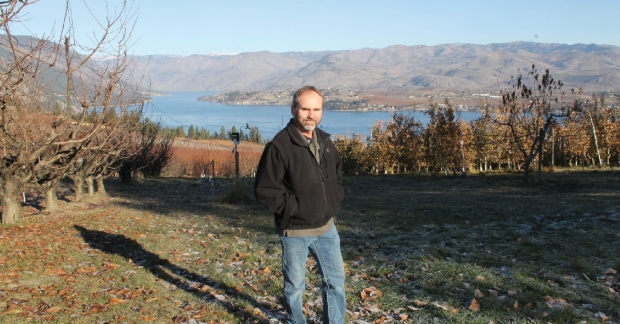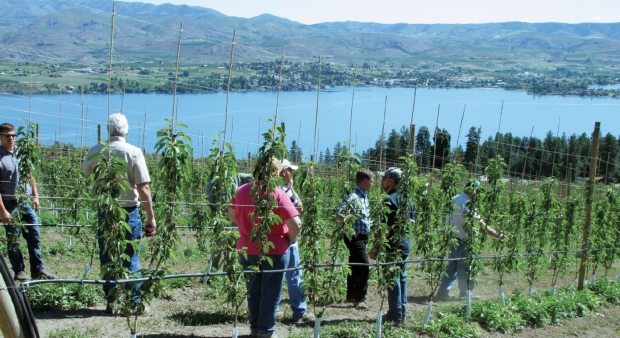
Ray Fuller was one of the first certified-organic tree fruit growers in Washington. Geraldine Warner/Good Fruit Grower
Chelan orchardist Ray Fuller, who’s grown fruit organically for the past 30 years, was honored with the Silver Apple Award by the Washington State Horticultural Association at its annual meeting in December.
Though Fuller uses different production techniques from most of the state’s tree fruit growers, he’s been deeply involved in mainstream industry affairs, and particularly in research.
“I saw that research was going to help me get to where I wanted to go,” he said. “I’ve always been science-based.”
He served on the Washington Tree Fruit Research Commission’s apple advisory committee for over a decade and was an advisory board member when Washington State University was establishing its new Sunrise Research Orchard near Wenatchee. He’s also encouraged researchers to do field trials in his own orchard.
Fuller took over the family farm overlooking Lake Chelan, Washington, right after graduating from WSU with a degree in general agriculture. His father, Graydon, who died in
1977 while Ray was in college, had moved the family to Chelan after retiring from the U.S. Army Corps of Engineers in Utah. Graydon planted about 28 acres of orchard, but focused primarily on raising bulls.
Fuller had no interest in cattle and gradually converted the pasture to orchard, farming conventionally, since that was all he knew about at the time.
Within a few years, he became concerned about the spray program he was using. It seemed that spraying for one pest just led to a need to spray for another, and he was worried about the effect of pesticides on his family, since their home was at the orchard.
He decided to try growing a few acres of fruit organically. This was in the early 1980s, when information was hard to come by, particularly as the Internet didn’t yet exist and few organic materials were available. He read all the books he could find on organic agriculture and tried to figure out how to apply the practices to tree fruit production.
It was not a philosophical decision or a desire for an alternative lifestyle. He was looking for a way of farming that made sense to him.
Tom Auvil, then field horticulturist for Trout, the Chelan cooperative where Fuller took his fruit, was a big help. “He looked at me sideways numerous times, but he was a very good resource,” Fuller recalls.
Auvil knew that Fuller was determined. “There was no dissuading him from going down that path,” he told Good Fruit Grower. “He had done so much legwork in trying to figure out how to make things work and what the issues were.”
Larry Lundberg, then manager of Trout, was skeptical. “They liked the idea, but they knew it was going to be a challenge,” Fuller said.
It would be another decade before mating disruption became available to control codling moth, so Fuller spent much of his time spraying Ryania (a botanical pesticide made from the ground stems of a tropical plant) and the codling moth granulosis virus. Even though he used additives to make them more effective, he had to spray every other row on a four- or five-day schedule. “It was a lot of work,” he said. “We sprayed a lot.”
Auvil said Fuller’s organic block had old Starking Red Delicious trees with rough bark that made codling moth particularly difficult to target. “It got to the point where he was spending a fortune spraying, and it still had too much damage,” he said.
Fuller’s response, characteristically, was not to give up on organic but to replant the block of trees.

Ray Fuller has welcomed countless visitors to his orchard at Chelan where they can admire cutting-edge horticulture and a view of the lake. Fuller is using a biaxis training system, which makes weed control easier than when trees are planted more densely. Geraldine Warner/Good Fruit Grower
All or nothing
After experimenting for two or three years, Fuller broke the news to Lundberg that it had to be all or nothing, because trying to be part organic and part conventional was turning into a nightmare.
“The look on Larry’s face was disbelief,” Fuller recalled. “But they stepped up to the plate, so it worked.”
Initially, his farm was certified through Washington Tilth, though the standards were quite loose. He was among the first to be certified with the Washington State Department of Agriculture when it began its Organic Food Program in 1988.
In the early 1990s, organic pest control suddenly got easier and more effective with the advent of mating disruption for codling moth for both organic and conventional use. Fuller had help from WSU entomologists Dr. Jay Brunner and Dr. Larry Gut who tested the technique in his orchard, in the first of many research trials he’s hosted.
Then, organic grower Harold Ostenson devised an effective organic fruit-thinning program using fish oil and lime sulfur, which addressed another challenge.
Fuller said the differences between organic and conventional practices are much smaller than they used to be. Conventional growers have learned from organic, recognized that there are other ways of doing things, and seen that softer approaches can be beneficial for the orchard and the industry as a whole.
But there are still distinctions. Conventional growers use many tools that don’t qualify as organic, such as synthetic fertilizers, herbicides, and certain pesticides. Fuller has only one option—Entrust (spinosad)—for controlling the spotted wing drosophila and worries that the new pest will develop resistance to the insecticide.
For nutrients, he uses composted chicken manure, and for weeding, his only option is tilling. He can’t risk flaming weeds because the orchard is surrounded by forest. In his recent plantings, he’s used a biaxis tree training system in which the trees have two leaders. This means there are half as many trunks as usual, which makes tilling around them much easier.
Fumigation
Preplant fumigation is not an accepted organic practice, and he’s not found an alternative that works, so, when he replants a block, he takes it out of organic certification and treats the ground to address replant disease. He immediately transitions back to organic so that it is certified by the third year, about the time the trees come into production. He usually sells the first crop as conventional.
Dr. Mark Mazzola, plant pathologist with the U.S. Department of Agriculture in Wenatchee, has done trials in his orchard testing various seedmeals to combat replant disease.
Fuller said some treatments are effective, but the question is whether they are economically feasible. The seedmeal is incorporated into the soil and the best results have been where the ground was covered with plastic to keep the gases in the soil.
He’s also hosted rootstock trials with rootstocks that have some tolerance to replant disease, including Geneva rootstocks.
As well as inviting scientists, he’s welcomed countless visitors from around the world to his orchard, which is on a steep slope 1,400 to 1,900 feet in elevation.
With its breathtaking view of Lake Chelan and cutting-edge horticulture, it’s an obligatory stop for grower tours. Fuller says he enjoys the exchange of ideas back and forth.
Auvil said Dr. Stefano Musacchi, WSU’s new pomologist, was “starstruck” to see such advanced horticulture when he visited the orchard the day before he started work.
Fuller now grows 115 acres of apples, pears, and cherries, which are packed and sold by Stemilt Growers, Wenatchee. He can expect a premium of 10 to 25 percent, depending on variety, over conventional returns.
Fuller said he’s never considered going back to conventional production, even now that the practices are softer than they used to be.
“It would be a lot harder for me,” he said. “I don’t know anything about using conventional materials any more. That would be a whole new learning curve for me.” •

Leave A Comment